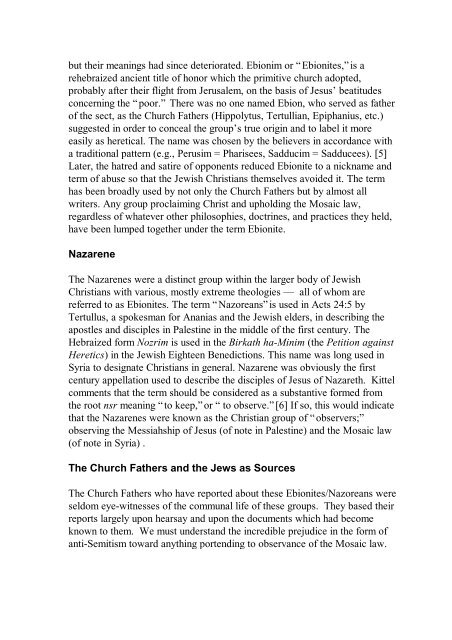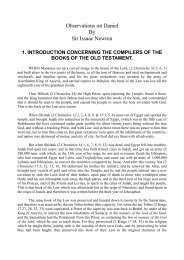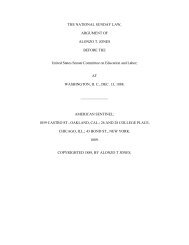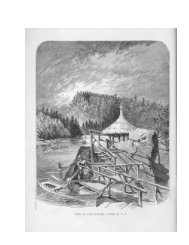Nazarenes_and Ebionites_Rogers.pdf - Friends of the Sabbath ...
Nazarenes_and Ebionites_Rogers.pdf - Friends of the Sabbath ...
Nazarenes_and Ebionites_Rogers.pdf - Friends of the Sabbath ...
Create successful ePaper yourself
Turn your PDF publications into a flip-book with our unique Google optimized e-Paper software.
ut <strong>the</strong>ir meanings had since deteriorated. Ebionim or “ <strong>Ebionites</strong>,” is a<br />
rehebraized ancient title <strong>of</strong> honor which <strong>the</strong> primitive church adopted,<br />
probably after <strong>the</strong>ir flight from Jerusalem, on <strong>the</strong> basis <strong>of</strong> Jesus’ beatitudes<br />
concerning <strong>the</strong> “poor.” There was no one named Ebion, who served as fa<strong>the</strong>r<br />
<strong>of</strong> <strong>the</strong> sect, as <strong>the</strong> Church Fa<strong>the</strong>rs (Hippolytus, Tertullian, Epiphanius, etc.)<br />
suggested in order to conceal <strong>the</strong> group’s true origin <strong>and</strong> to label it more<br />
easily as heretical. The name was chosen by <strong>the</strong> believers in accordance with<br />
a traditional pattern (e.g., Perusim = Pharisees, Sadducim = Sadducees). [5]<br />
Later, <strong>the</strong> hatred <strong>and</strong> satire <strong>of</strong> opponents reduced Ebionite to a nickname <strong>and</strong><br />
term <strong>of</strong> abuse so that <strong>the</strong> Jewish Christians <strong>the</strong>mselves avoided it. The term<br />
has been broadly used by not only <strong>the</strong> Church Fa<strong>the</strong>rs but by almost all<br />
writers. Any group proclaiming Christ <strong>and</strong> upholding <strong>the</strong> Mosaic law,<br />
regardless <strong>of</strong> whatever o<strong>the</strong>r philosophies, doctrines, <strong>and</strong> practices <strong>the</strong>y held,<br />
have been lumped toge<strong>the</strong>r under <strong>the</strong> term Ebionite.<br />
Nazarene<br />
The <strong>Nazarenes</strong> were a distinct group within <strong>the</strong> larger body <strong>of</strong> Jewish<br />
Christians with various, mostly extreme <strong>the</strong>ologies — all <strong>of</strong> whom are<br />
referred to as <strong>Ebionites</strong>. The term “ Nazoreans” is used in Acts 24:5 by<br />
Tertullus, a spokesman for Ananias <strong>and</strong> <strong>the</strong> Jewish elders, in describing <strong>the</strong><br />
apostles <strong>and</strong> disciples in Palestine in <strong>the</strong> middle <strong>of</strong> <strong>the</strong> first century. The<br />
Hebraized form Nozrim is used in <strong>the</strong> Birkath ha-Minim (<strong>the</strong> Petition against<br />
Heretics) in <strong>the</strong> Jewish Eighteen Benedictions. This name was long used in<br />
Syria to designate Christians in general. Nazarene was obviously <strong>the</strong> first<br />
century appellation used to describe <strong>the</strong> disciples <strong>of</strong> Jesus <strong>of</strong> Nazareth. Kittel<br />
comments that <strong>the</strong> term should be considered as a substantive formed from<br />
<strong>the</strong> root nsr meaning “ to keep,” or “ to observe.” [6] If so, this would indicate<br />
that <strong>the</strong> <strong>Nazarenes</strong> were known as <strong>the</strong> Christian group <strong>of</strong> “ observers;”<br />
observing <strong>the</strong> Messiahship <strong>of</strong> Jesus (<strong>of</strong> note in Palestine) <strong>and</strong> <strong>the</strong> Mosaic law<br />
(<strong>of</strong> note in Syria) .<br />
The Church Fa<strong>the</strong>rs <strong>and</strong> <strong>the</strong> Jews as Sources<br />
The Church Fa<strong>the</strong>rs who have reported about <strong>the</strong>se <strong>Ebionites</strong>/Nazoreans were<br />
seldom eye-witnesses <strong>of</strong> <strong>the</strong> communal life <strong>of</strong> <strong>the</strong>se groups. They based <strong>the</strong>ir<br />
reports largely upon hearsay <strong>and</strong> upon <strong>the</strong> documents which had become<br />
known to <strong>the</strong>m. We must underst<strong>and</strong> <strong>the</strong> incredible prejudice in <strong>the</strong> form <strong>of</strong><br />
anti-Semitism toward anything portending to observance <strong>of</strong> <strong>the</strong> Mosaic law.
















